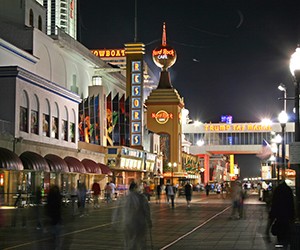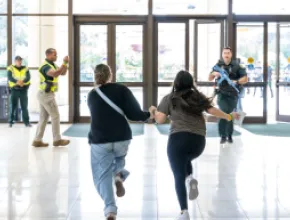Despite Hurricane Sandy’s best efforts to wash Atlantic City off the Eastern Seaboard, the venerable resort emerged from the deluge sodden but unbowed.
“The world thinks Atlantic City got destroyed, but it didn’t,” says Gary Musich, vice president of convention sales for the Atlantic City Convention & Visitors Authority, referring to news images depicting a flooded downtown and destroyed boardwalk following Sandy’s landfall Oct. 29 just a few miles south on the New Jersey shore.
“If you drove through here right now, you’d never know anything happened,” Musich says. “All the water has receded and has been cleaned up. Every hotel and casino is open right now. The Atlantic City Convention Center experienced no damage and is a Red Cross shelter and FEMA staging area. And Boardwalk Hall, which is our events center, experienced no damage. Atlantic City was very fortunate in comparison with some barrier island communities.”
The city’s famous boardwalk suffered no damage downtown; the destroyed part of the boardwalk is located north near the inlet, according to Musich. “That part of the boardwalk was old and scheduled to be replaced," he says.
“The beach suffered some erosion,” Musich adds. “But recently there have been major Army Corps of Engineer replenishment projects, with dune building, that really saved the city.”
All scheduled meetings and conventions were canceled the weekend immediately before the storm struck, when state authorities ordered an evacuation, and for the following two weeks, according to Musich.
“We have suffered significant loss,” Musich says of Atlantic City’s meetings business, estimating that events totaling 72,000 people were canceled. “But most of those customers are pledging to return at some point, and some have re-booked already.”
The largest group to cancel was the New Jersey Education Association (NJEA), whose annual convention was scheduled Nov. 8-9. In a statement, NJEA President Barbara Keshishian explained that regional circumstances beyond the city’s control prompted the cancellation, a first in the organization’s 158-year history:
“We concluded it was simply not advisable to try to have that many people on the roads and using public transportation while so many communities are struggling to restore power and basic services to their residents, including NJEA members,” she wrote.
Atlantic City’s hospitality community shares that assessment, according to Musich.
“Anybody who’s canceled due to the storm over the past two weeks, we will not, nor has any property, held them to a financial obligation,” Musich says. “We continue to work with them. Their attendees are regional; they suffered damage to their homes and couldn’t get here. If they had any choice, they would absolutely be doing their event.”






